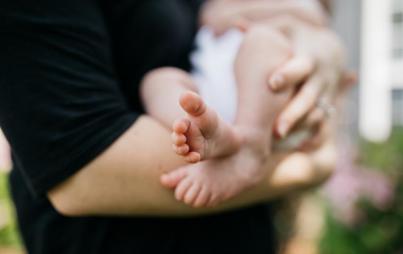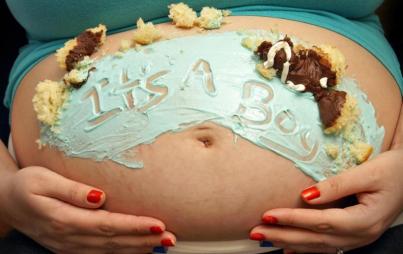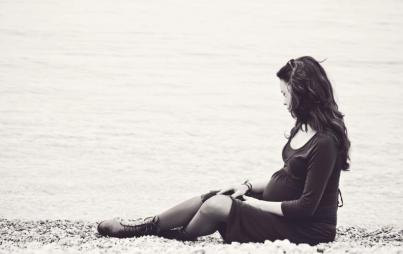
Postpartum Relity Photo credit: Danielle Haines
Other mothers have gone before you. Other mothers will come after you. There is a sisterhood in our postpartum experience. If we allow it, our lives will be forever changed. You are not alone. You are never alone.
This is Danielle. I came across her (now-viral) photo. Her rawness, her sadness, her fear . . . they gave me pause. Not because I wanted to see her suffering —because I know her suffering. Danielle shared her truth with the world, uncovering the wound that is the postpartum period.
When the balloons have deflated. When the flowers have died. When everyone has gone home. Then what?
Postpartum. It’s sometimes called the fourth trimester, but if you’ve never had a baby, or you’ve never been in my social circle, you might not know that.
♦♦♦
On a scorching day in August 1995, my first baby was born. She was long and lean, pink all over, and covered in hair. I was in love.
Every day of the preceding 36 or so weeks had led up to that moment. The Lamaze classes, the 11 books I read about childbirth and babies and parenting, the hospital tour, the shopping, the decorating — it all pointed to that day.
She was born.
I took that little pink baby home, laid her gently in the bassinet she would never use, and I went to change my blood-soaked underwear. My vulva and vagina were unrecognizable — swollen, purple, painful. My butt felt like I’d been punched . . . by a car. My squealing red-faced newborn lay four feet away, and I still looked seven months pregnant. The parts of my abdomen that didn’t look pregnant looked deflated. My breasts were droopy, my nipples sore. My back hurt. My ass hurt. I was hungry. I was tired. I was scared. I was everything. . . And nothing — at the same time.
Twenty-four hours later came the milk. And 24 after that, the tears.
Add this to the list of things you don’t know before you have a baby.
♦♦♦
Everyone tells you the pains of pregnancy: the morning sickness, the stretch marks, the cravings, the swollen feet, the hemorrhoids. And everyone tells you the haunting tales of birth: the labor, the ring of fire, the cursing, the pooping. All of the pooping.
And no one ever really tells you what it’s like when all that is over and the magic of pregnancy has become the sometimes-not-so-magic of postpartum.
Suddenly, where there was something there is nothing, and where there was nothing, there is a real human baby. And the real human baby needs you. And maybe no one has ever needed you before. Or maybe you’re needed by a bunch of other humans, whose needs remain, whether there’s a new human in the house or not.
There are so many things that you can’t know . . . Until you know them.
You will bleed. They will tell you it’s ‘like a period’ — it may be nothing like a period. You may have blood clots falling into the toilet. It may feel like another small baby is coming out of your vagina. It will definitely be messy. It may be like Game of Thrones in your underwear.
Your whole body may hurt. You’ve just run a uterine marathon. You are going to be sore. You just are. If you’ve had a Cesarean section, you have a whole other set of things that will be sore. This is normal. You may cry about all of this. You may cry a lot. Essential oils aren’t going to cut it. Take the pain medication. No one gets a blue ribbon for agony.
You body will look different. It may look dramatically different. Your body just grew a whole person. That’s a big job. That doesn’t mean you’ll be able to honor it. It’s OK if you can’t. You may hate it. That’s normal, too.
Your breasts may be completely full, possibly erupting, with milk. Your nipples may be sore. They may be really sore. Nursing may not be easy. That may make you feel sad. You may see images of the Madonna and child and be pissed you don’t look that serene. You may not be able to nurse at all. This may make you even more sad. It’s OK. Just feed your baby. However you can. Sometimes shit doesn’t work out like we think it will. Sometimes nursing is less like Mozart and more like Metallica.
You may be exhausted. Your baby may not sleep very much. Someone will ask you if your baby is ‘good’ — tell them to shut up. Tell them I told you to tell them to shut up. Sleep does not make a baby ‘bad’ or ‘good.’ Babies need mommies. It’s not always easy. Sometimes it’s really hard. It’s normal. It’s a biological imperative. That doesn’t mean you will love it. You might really hate it. That’s OK.
It — this whole thing — is hard. It is really really hard. You may resent your baby, or your partner for producing the sperm that made the baby, or yourself for resenting your partner and your baby. You may want to put your baby in the floor and go to Paris (or just the shower). You may want to scream, cry, or go bed and pull up the covers and pretend none of this ever happened. These are things that lots of people feel. There are people to help you. There is no shame in asking for it.
And speaking of help . . . our culture has a bad habit of praising people for suffering. The more you give, the more revered you are. I don’t know where this idea was born; it was probably a patriarchal thing. But it’s a lie. No one gets a blue ribbon for doing All The Things. Let someone else do All The Things. If you have a friend who will wash your floors, hand them the mop and go back to bed.
You may cry — from exhaustion, from depression, from the sheer terror of being responsible for an entire human life, from all of those. At the same time. The crying may be unrelenting. You may feel like you’re going insane. You may be going a little bit insane. You may not want anti-depressants. You may need anti-depressants. You are not a bad mother. You don't love your baby any less than the mother who isn't paralyzed with sadness. Listen to me, you are not alone. There is no shame in needing help. No one wins a blue ribbon for enduring months of crippling depression. You don't have to suffer, don't.
This may be the first time you’ve done this. This may the fifth time you’ve done this. You may feel like you don’t know what you’re doing. You may be terrified. You may feel liken you’re failing. You may wish you had never had children at all. You may want to take it all back. You may feel like you’re never going to make it, but you will.
This fourth trimester can be bliss — it can also be a nightmare, or it can land anywhere on the bliss-nightmare scale.
All of these things are normal.
Other mothers have gone before you. Other mothers will come after you. There is a sisterhood in our postpartum experience. If we allow it, our lives will be forever changed. You are not alone. You are never alone.
If you feel alone, tweet at me.
Here is what Danielle, our beautiful momma pictured about had to add:
I'm a student midwife and I've been working with women birthing their babies for over 10 years. I have seen how difficult the postpartum can be. And I have seen how beautiful it can be. Bottom line, we need a support system in place the way that our ancestors have always done it. Please check out this website medicineformamas.com for additional information on how you can set up a support system.
Would you like to share your postpartum experience? Feel free to do so in the comment section. Create a community.







